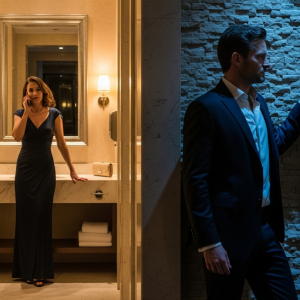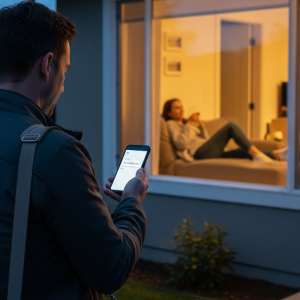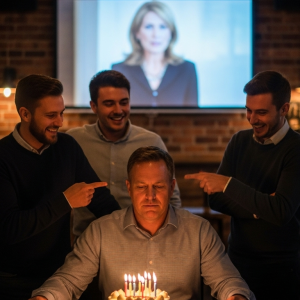I’m twenty-eight now, but the toxicity that shaped my life began at birth. I have a twin sister, and in our case, the bond that people imagine was a chain I dragged behind me. She was the one who pulled me down every chance she got.
My parents always wanted a daughter. They got one, but I came along with the package. They told me to my face, more than once, that if the ultrasound had only shown a boy, they would have terminated the pregnancy. “You owe your life to your sister,” my mother would say, a phrase that became the anthem of my childhood. I was an afterthought, an obligation.
Growing up in our tiny suburban house was a lesson in being invisible. Everything was about my sister. We were the same age, but her toys were hers alone. She received new clothes constantly, while I got a single pair at Christmas and one on our shared birthday. If we didn’t share a birthday, I doubt they would have celebrated mine at all. I received the bare minimum, not out of love, but to save face in front of our relatives.
My only light in that darkness was my grandfather. He saw through their nonsense and treated me with a warmth I found nowhere else. He passed away when I was thirteen, and with him went my only ally.
My sister and I shared a room. Or rather, I had a bed in a tiny closet carved out from under the stairs in her room. The space was filled with her clothes, her toys, her posters. I was only allowed in at night to sleep. Even when I was sick, I had to lie on the living room couch because she, as a girl, “needed her privacy.” I desperately counted the days until I turned eighteen, when I could finally escape. It turns out my family was even more desperate to get rid of me.
When we were sixteen, my sister got pregnant by a nineteen-year-old loser her age. My parents, furious but determined to maintain appearances, arranged a quick marriage. My father got his new son-in-law a cleaner’s job at his factory and brought him home to live with us.
Our two-bedroom house was suddenly too small. I was told to move out of my closet to make space. “Can I sleep on the couch?” I asked my father.
He shook his head. “No. That’s where I sleep when your mother’s snoring gets too bad.” On cold winter nights, I was simply told to find another place. My new brother-in-law, a man who had been thrown out by his own parents at fifteen, had the gall to offer me advice. “Dude, it’s not so tough,” he’d say with a smirk. “Trust me, it’s gonna get better out there.” I just sighed. If living off your in-laws and knocking up a minor meant putting your life together, then sure.
My parents threatened me, warning me not to show up at any relatives’ homes, lest I expose their toxicity. I was utterly alone.
After a few friends’ parents understandably refused to take me in, I ended up sleeping on a park bench for several days until the cops picked me up and brought me home. My parents, masters of manipulation, told the officers I had run away. To “reward” me for staying silent and not going to our relatives, my father retrieved a makeshift tent from a junkyard. “Set it up in the backyard,” he ordered.
A tent was safer than sleeping in the open. Summer was bearable. Winter was a frozen hell. One night, the cold was so bone-deep I thought I was going to die. I knocked on the back door, desperate for warmth, but no one answered. I tapped on my parents’ bedroom window.
My dad’s voice roared from inside. “Don’t disturb me, or I’ll come out there and knock you down!”
I felt so miserable I wanted to die. I cried for the whole night, huddled in the freezing darkness. The next day, I started searching for any job that would give me a roof over my head. I found one at a bakery twenty miles away. The owner needed a helping hand in his home-based factory and agreed to give me a place to sleep and food to eat. The “place” was a filthy backyard storage space, overrun with rodents surviving on spilled flour and sugar. But at the lowest point of my life, it felt like a palace.
I packed my few belongings and left. My sister watched me go, a smile on her face. “Good that you’re leaving,” she said. “We don’t have space for you here.” No one asked where I was going.
I dropped out of high school just months before my final exams. I cleaned up that storage space, made it habitable, and worked harder than I ever had in my life. I knew I had to upskill myself to escape. My dad was a mechanic, and I’d grown up playing with his tools. I saved up what little I earned, took a course, and eventually got a job at a car plant. I worked my tail off, climbing the ladder one rung at a time. Now, twelve years later, I’m a supervisor.
Recently, an old friend was selling his three-bedroom house urgently due to a divorce. He offered me a significant discount and let me pay the down payment in installments. I grabbed the opportunity. Two weeks ago, I moved in.
Today, I found unexpected guests at my door. My parents, my sister, and her husband. I haven’t spoken to them in years. My house is fifteen miles from theirs, so this was no casual visit. I suspect an old neighbor, who I’m still friendly with, saw my pictures on Facebook and told my parents.
As soon as I opened the door, they pushed their way inside, congratulating me, telling me how proud they were. I offered them the few chairs I owned. They sat down and immediately started grilling me about the deal, their faces a mixture of disbelief and envy that I, at twenty-eight, could own a house while they still lived on rent.
Meanwhile, my sister and her deadbeat husband were strolling through the rooms as if they were measuring for curtains.
“What’s going on?” I finally asked my parents. “Why are you here?”
“Nothing,” my mom said with a strained smile. “Just checking on you.” Funny. They never checked on me when I was freezing in a tent.
My mom then asked if I had a girlfriend. “None of your business,” I replied. “Why are you so cranky?” she laughed. “If settling in is overwhelming, I can lend a hand.”
Just then, my sister breezed back into the room. “I’ve decided we’ll take the master bedroom,” she announced, as if discussing the weather. “The one with the balcony. The kids can have the other room.”
I completely flipped out. “What in the world are you talking about?”
“You have a three-bedroom house and you’re a single man,” she said, her voice dripping with entitlement. “You don’t need this much space. You used to live in a tent, so a bedroom is quite an upgrade for you. This house is big enough to accommodate all of us.”
I looked at my parents, my eyes blazing. “What did she just say?”
My father cleared his throat. “It’s getting difficult with seven people in that small house,” he began. “Your sister is pregnant again, and they need more space.”
“And you own a big house now,” my mother chimed in. “Can’t you just take your sister in?”
Before she could finish, I yelled, “Absolutely not! I am not taking anyone into my house!”
My sister screamed back, parroting the old line. “You owe me this! Mom and Dad would never have had you if it weren’t for me! You owe me a place here!”
“Yes, thanks for bringing me into this world,” I said, my voice dangerously calm. “Now get out.”
My dad tried his old tough-guy routine. “It is your duty as the man of the house to take care of your sister!”
I roared back at him, twelve years of fury erupting at once. “I have no obligation to take care of her! But you, as a parent, were obliged to take care of ME, and you failed! You were okay with your grandson sleeping on the couch, but when I asked for it, you threw me out into the cold! I survived with rodents in a stranger’s garage! I lived in a dingy apartment for a decade, and not once did any of you come to check on me!”
My mom started sobbing and tried to hug me. I blocked her. I chased them all out of my house, my rage a wall they couldn’t penetrate. I’m not a sixteen-year-old puppet anymore
A week later, my mom showed up again, alone. This time, there was no pretense. “You should put your guard down and let your sister move in,” she said. I said no. She tried to threaten me. “You live alone in this big house,” she said, her tone shifting. “What if someone breaks in? It would be so much safer with family here.”
“For the last time, no,” I said, and closed the door.
A few days later, my elderly neighbor called. He’d seen a pregnant woman, a man, and a young boy loitering around my property, peeping in windows. I thanked him and asked him to call me if he saw them again. I had planned to install security cameras that weekend. I was too late.
Two days after that, my neighbor called again. He suspected someone had broken into my house. I rushed home in a panic. He was right. They had forced open a back window. My sister and her husband were in my living room, unpacking bags.
“We had no other choice,” she said with a triumphant smirk. “You were being a jerk, so now we live here. Suck it up.”
I was in shock. Her husband emerged from what was now “their” bedroom. “Pretty smooth, huh?” he gloated.
Without thinking, I charged at him. My sister got between us, and I dragged her aside. I punched him squarely in the face. Their fourteen-year-old son then attacked me from behind with a bottle, and I felt a sharp pain as my head started bleeding. The blow wasn’t severe, but the rage kept me on my feet.
They all panicked at the sight of blood. My sister called my parents. My neighbor, hearing the commotion, called the cops. My sister and her husband started begging me to spare their son from being arrested. “All of you are going down with him,” I snarled.
When the cops arrived, my sister spun a ridiculous lie, claiming they were just visiting and I had “accidentally” slipped and hit my head. My parents arrived and ganged up on me, trying to force me to drop the charges.
Thank God for my neighbor. He gave his statement, detailing the loitering and the break-in. Based on his testimony, the police arrested my sister, her husband, and their son. They spent the night in jail because my parents didn’t have the money to bail them out. I pressed assault charges and claimed compensation for my lost wages and medical bills. Her son, being a minor, was sent to a juvenile facility for a week.
You would think that would be the end of it. You would be wrong. Yesterday, my parents showed up at my house again. I slammed the door in their face, but they stood outside for an hour, pleading. Finally, I let them in.
They both started sobbing, saying they needed my help. “If this is about my sister,” I warned, “count me out.”
“It’s about us,” my dad said. “I’m growing old, I can’t work like I used to. The house is falling apart. We want to move in with you.”
I stared at them. “And what happens to your house?”
“We’re going to give it to your sister,” my mom whispered.
I laughed. A cold, bitter laugh. “So you’ve found another way to exploit me. First, you try to dump her on my back. When that fails, you try to pile on yourselves so she can have your house. For the last time, my house is not up for grabs. Not for anyone.”
They tried to manipulate me, crying about taking care of their aging parents.
“Karma is real,” I said, my voice like ice. “Remember how you threw me out of the house when I had nothing? This is you getting it back in return.” I opened the door for them, and they left with bitter, defeated faces. I don’t care what they call me. I am not their doormat, and I will never again give in to their demands.




